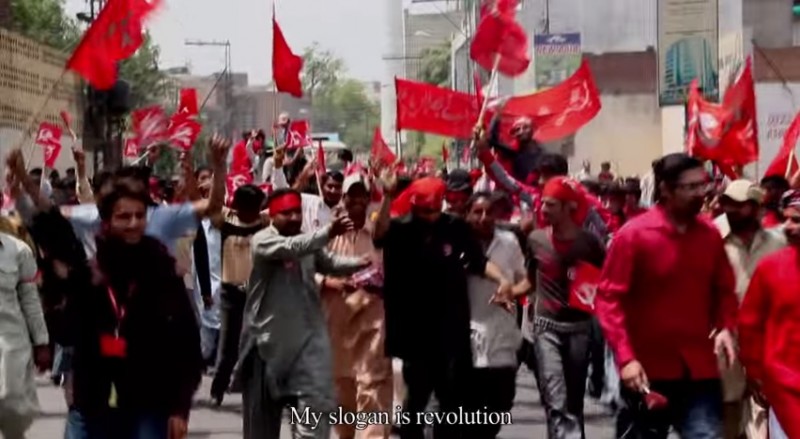
Still from Laal’s video for the song ‘Inqalab’ – one of many videos rendered inaccessible by the ban on YouTube.
Laal, Pakistan’s most vocal social justice-oriented band, has built a career around using their platform as musicians to advocate for change and spread social awareness through their music, often through the Internet.
Facebook and YouTube have played a critical role for the band in publicizing their music and connecting with fans, but the Pakistani government has targeted those same websites for censorship. As Pakistan's authorities continue to block the corners of the Internet that helped Laal build an audience, Global Voices spoke to Dr. Taimur Rahman, Laal frontman and academic, for his perspective.
Laal, whose name means “red,” in reference to their socialist politics, came into the spotlight several years ago during the mass protests known as the Lawyers’ Movement, which demanded the country's ousted chief justice be restored to the Supreme Court. The band joined the campaign and providing a soundtrack to the movement.
When Pakistan issued a YouTube ban in 2012, Laal was one of the many bands that felt the effects. Additionally, Laal’s Facebook page has been banned a few times — a noteworthy blow, considering they have over 400,000 Facebook likes and reach many of their followers specifically through social media.
Facebook page ban
In June, Laal's Facebook page was banned, along with 162 other pages. Frontman Taimur quickly took to social media, tweeting and posting Facebook statuses about the ban, which were quickly picked up by fans.
Dear friends, we have reason to believe that PTA has shut down our page in Pakistan once again. Could you please… http://t.co/x14deXVtoz
— Dr. Taimur Rahman (@Taimur_Laal) July 10, 2014
He also posted this picture to his Facebook profile:
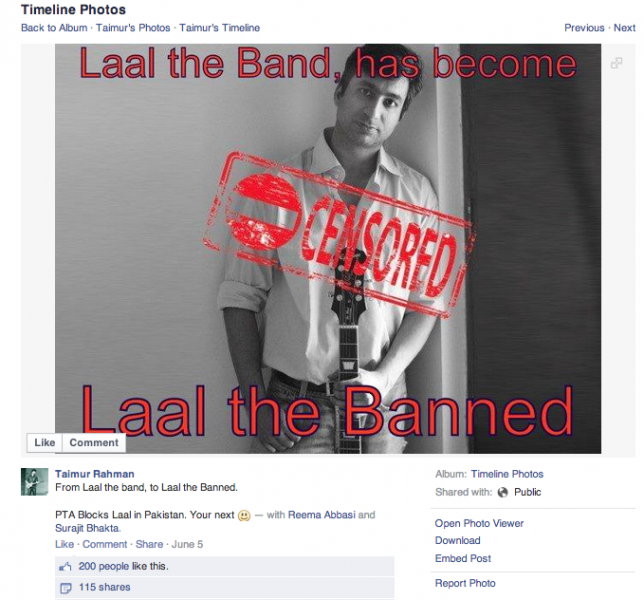
Screenshot of an image from Taimur's Facebook. Image is a black and white photo of Taimur with a red “CENSORED” stamp across his body, and the text “Laal the Band, has become Laal the Banned”
Taimur told Global Voices that the ban was an attempt to demotivate Laal’s efforts to spread awareness about freedom of speech and social justice. He said that the ban was ordered by the Pakistan Telecom Authority (PTA), which he jokingly referred to as the Pakistan Taliban Authority in a tweet. Eventually, the PTA backed off and claimed to have nothing to do with the ban, and the ban was lifted.
“It’s very shadowy and Orwellian,” Taimur said in conversation with India Post Live, in reference to the ban being levied suddenly, without giving an explanation or any particular party taking responsibility for it. “There has to be some sort of process.”
Although the PTA claimed to have nothing to do with the ban, PTA has a hidden contract with Facebook, according to Pakistani lawyer and blogger Yasser Latif Hamdani.
The ban ended up being an asset for Laal, as it called attention to their cause, brought them more followers, and put them back on the news. Laal is currently using the momentum to plan a tour of rural Punjab, Pakistan.
Unfortunately, bands with less Internet notoriety who have had their social media presence banned have not been as lucky — bands who were fairly anonymous to begin with are now even more anonymous, as their access to social media continues to be blocked.
YouTube ban
Laal, which gained a lot of popularity through YouTube, knew that its reach would be affected when YouTube was banned in Pakistan. The ban was imposed in 2012 after “Innocence of Muslims,” a 14-minute long video featuring virulent anti-Islamic content, caused an uproar in the Islamic world. Although other Islamic countries such as the United Arab Emirates and Bangladesh also initially imposed the ban, it currently remains in effect only in Pakistan.
Many oppose the ban — for example, this Facebook community was made in reaction to the ban:
Still, others express public support for Internet censorship. A poll on the YouTube Ban on popular tech blog ProPakistani.pk found that readers would only support opening YouTube with certain restrictions, or not opening it at all (The site has previously published articles in support of Internet censorship, and led polls that overwhelmingly supported banning Facebook).
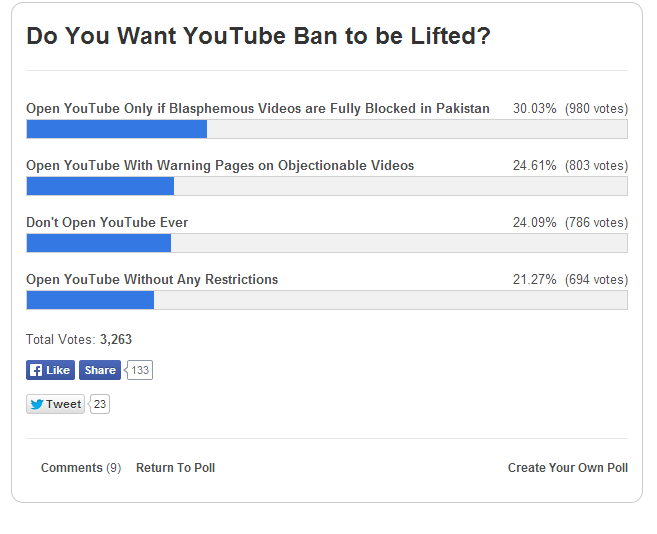
ProPakistani.pk poll asking the question, “Do You Want YouTube Ban to be Lifted?” 30 percent said yes, only if blasphemous videos are fully blocked in Pakistan; 24 percent said yes, with warning pages on objectionable videos; 24 percent said do not open YouTube ever; 21 percent said open YouTube without any restrictions.
Taimur said the ban had a great impact on musicians, as YouTube was a major platform to promote their music. When Global Voices asked Taimur whether he thought young people lost interest in music after the ban, he answered he thought they did, since YouTube was a major source of entertainment and a platform to find new music. He said attempts are being made to keep the music going, but he thinks that the ban needs to be lifted so that people could post new music and again have a place to be discovered.
For him, the only way to revive the beauty of progressive music is to open YouTube in Pakistan.
Alternative networks
In the meantime, citizens are still waiting for YouTube access to return. Some are able to open YouTube through proxies, but most proxies are unreliable and face connection issues. Those who do not have the patience to wait for proxies to load must wait for the ban to be lifted.
There are other sites for artists and musicians to upload and promote their work, including Vimeo and Dailymotion. However, these sites are still much less popular than YouTube and enjoy less viewership.
Now that the controversial video “Innocence of Muslims” is no longer on the site, people question the reason for the ban. According to a story in English-language newspaper the Daily Times, Pakistan’s National Assembly unanimously voted to lift the YouTube ban on May 6, 2014. However, at the time of publication, YouTube remains inaccessible.
Tech-savvy entrepreneurs have had more creative reactions to Facebook bans. After Pakistan placed one ban on Facebook in 2011 following a “competition” calling for caricatures of the Prophet Muhammad, Omer Zaheer Meer created MillatFacebook — a Facebook clone that called for users to “respect humanity,” “respect beliefs of all people” and “not disrespect anyone.” The site currently has nearly half a million users, but, according to a 2013 post by the Express Tribune, it is currently going through financial trouble and its future is uncertain.
Krishnan Unni, a professor at Delhi University, called for future generations to take a radical stance and form underground networks of resistance. “Multiple sites of resistance can come together and propose — this is where we are, this is where we can interject our peculiar kind of politics,” he said in conversation with India Post Live. “The new music which is coming up from all third world nations is an antinomy against any kind of established structure like the Information Broadcast Ministry. All of us need to realize that we are not living within a totalitarian regime, but snooping and surveillance against each and every individual is happening right now. We need to organize ourselves.”
With additional reporting by Annie Zaman.

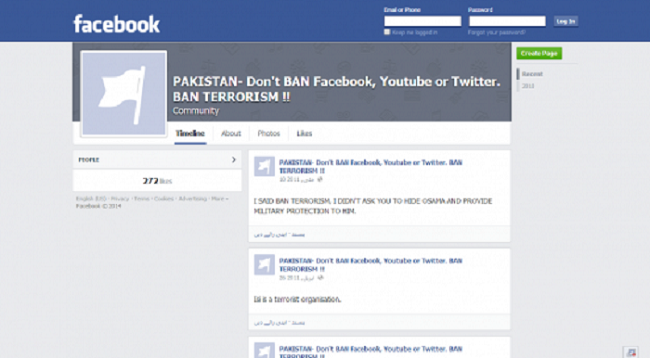


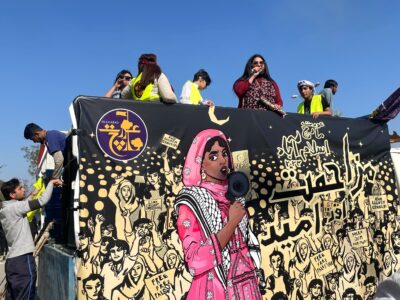



4 comments
woooow….thanks Anushe Noor Faheem for letting us know bout the incredible band!